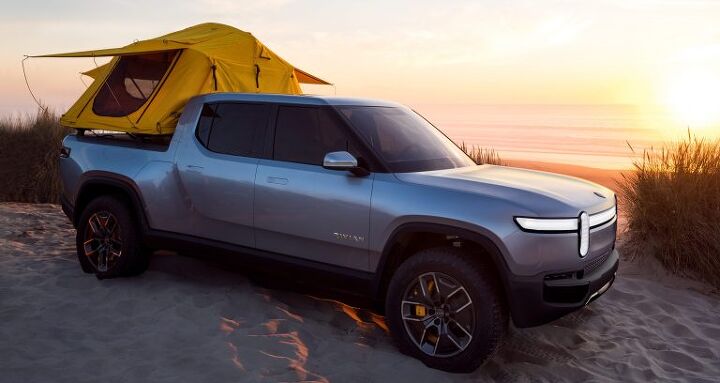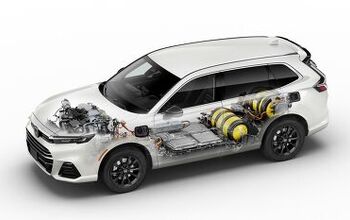GM-Rivian Talks Break Down, but Rivian Doesn't Seem Worried

General Motors has been negotiating with Rivian, the Michigan-based company developing some of the slickest EVs we’ve seen in a while, over the possibility of purchasing an equity stake in the promising startup. Following news that Amazon was leading a $700 million round of funding in Rivian in February, reports came streaming in that the biggest of The Big Three would likely become the startup’s next backer.
The rumored deal was expected to result in GM bringing an electric pickup to market sooner than anticipated, with Rivian seeing a boost to its funds and manufacturing capabilities. However, talks don’t appear to have progressed as expected.
According to Bloomberg, tipsters close to the matter say discussions between the two companies have effectively stalled — with no new discourse taking place within the last two weeks. Similarly, neither side is offering much (via their official channels) to refute the assertion that the proposed deal is dead in the water.
“As we have stated, we admire Rivian’s contribution to a future of zero emissions and an all-electric future,” GM spokesman Pat Morrissey said in a statement. “Talks occur on a regular basis in the auto industry between a variety of partners, but as a matter of policy we don’t discuss who, where or when those discussions might occur.”
While not particularly encouraging, Morrissey has a point. Closed-door meetings are pretty common within any industry, often resulting in nothing more than two sides having some face time before discussions fizzle out. Rivian founder R.J. Scaringe seems aware of this too, as the company has stated before that it would prefer to sell its technology to multiple manufacturers if possible.
Scaringe has also said Rivian isn’t in desperate need of financing because backers, led by Japan’s Sumitomo Corporation and Saudi auto distributor Abdul Latif Jameel Company Ltd., are committed to seeing the company succeed in its existing goals. Rivian has already claimed it can deliver its R1T pickup and R1S SUV in 2020 after raising around $1.15 billion. Any additional funds it manages to procure in 2019 are supposed to go toward its next development phase.
Having already purchased the former Mitsubishi/Diamond-Star Motors plant in Normal, IL for a paltry $16 million, the startup says it’s in a good position to deliver on its promises. It’s currently revamping the facility using its own funds, helped along by several million in state-sponsored incentives. The resulting vehicles are said to yield as much as 400 miles of electric driving range, more than enough to be competitive, as well as “evolving” autonomous capabilities.
As for GM, it’s probably too early to anticipate what the company will do regarding Rivian. While its statement regarding the matter seems a little terse, the automaker is really only reiterating what it said following February’s Amazon announcement — back when the world seemed certain it would invest.
[Images: Rivian]

A staunch consumer advocate tracking industry trends and regulation. Before joining TTAC, Matt spent a decade working for marketing and research firms based in NYC. Clients included several of the world’s largest automakers, global tire brands, and aftermarket part suppliers. Dissatisfied with the corporate world and resentful of having to wear suits everyday, he pivoted to writing about cars. Since then, that man has become an ardent supporter of the right-to-repair movement, been interviewed on the auto industry by national radio broadcasts, driven more rental cars than anyone ever should, participated in amateur rallying events, and received the requisite minimum training as sanctioned by the SCCA. Handy with a wrench, Matt grew up surrounded by Detroit auto workers and managed to get a pizza delivery job before he was legally eligible. He later found himself driving box trucks through Manhattan, guaranteeing future sympathy for actual truckers. He continues to conduct research pertaining to the automotive sector as an independent contractor and has since moved back to his native Michigan, closer to where the cars are born. A contrarian, Matt claims to prefer understeer — stating that front and all-wheel drive vehicles cater best to his driving style.
More by Matt Posky
Latest Car Reviews
Read moreLatest Product Reviews
Read moreRecent Comments
- Lou_BC Well, I'd be impressed if this was in a ZR2. LOL
- Lou_BC This is my shocked face 😲 Hope formatting doesn't fook this up LOL
- Lou_BC Junior? Would that be a Beta Romeo?
- Lou_BC Gotta fix that formatting problem. What a pile of bullsh!t. Are longer posts costing TTAC money? FOOK
- Lou_BC 1.Honda: 6,334,825 vehicles potentially affected2.Ford: 6,152,6143.Kia America: 3,110,4474.Chrysler: 2,732,3985.General Motors: 2,021,0336.Nissan North America: 1,804,4437.Mercedes-Benz USA: 478,1738.Volkswagen Group of America: 453,7639.BMW of North America: 340,24910.Daimler Trucks North America: 261,959




































Comments
Join the conversation
GM would have walked once they saw that the company was essentially vaporware as well - it's a legit angle that has to be taken into consideration.
Here's a question, did Rivian inherit UAW when it purchased the Mitsu/DSM facility?